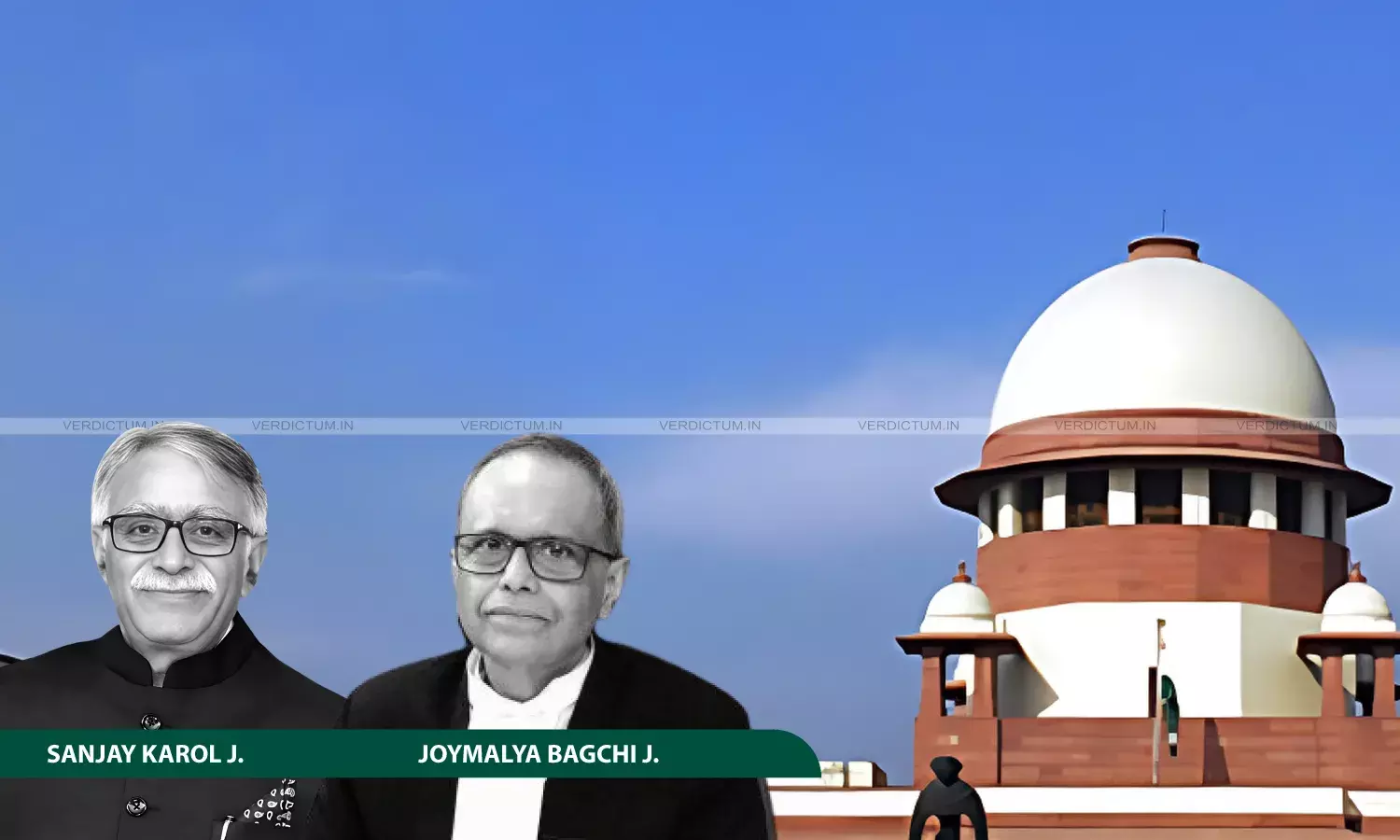License To Drive Light Motor Vehicle To Be Considered 'Valid' Even For Commercial Vehicles Weighing Not More Than 7500 Kg: Supreme Court
The Supreme Court was considering an Appeal against an order passed by the High Court of Madhya Pradesh which, in turn, was preferred against the award passed by the Motor Accident Claim Tribunal.

Justice Sanjay Karol, Justice Joymalya Bagchi, Supreme Court
The Supreme Court has held that if a Driver holding a license to only drive a Light Motor Vehicle (LMV), it will however be considered 'valid' for a commercial vehicle weighing not more than 7500 Kg.
The Court was considering an Appeal against an order passed by the High Court of Madhya Pradesh which, in turn, was preferred against the award passed by the Motor Accident Claim Tribunal.
The division bench of Justice Sanjay Karol and Justice Joymalya Bagchi observed, ".....in our considered view, in the present case, although the offending vehicle is a commercial one and the driver of the said vehicle at the time of accident possessed a license to only drive a Light Motor Vehicle (LMV) and, considering the gross weight of the vehicle in question is not in excess of 7500 Kg., the driver can be said to be holding a valid license to drive the same."
The Appellant was represented by Advocate Sanjay Kumar Dubey while the Respondent was represented by Advocate-on-Record T. Mahipal.
Facts of the Case
On November 27, 2013, the deceased was returning home from a weekly market, travelling in a vehicle i.e., TATA 407 Truck being driven by Respondent No. 3. The said vehicle being driven, in a rash and negligent manner, met with an accident and as a result, the deceased sustained severe injuries and died on the spot. A Claim Petition was filed on behalf of the Appellants (the legal representatives of the deceased) under Section 166 of the Motor Vehicles Act, 1988, before the Tribunal seeking compensation to the tune of ₹49,26,000/- claiming the income of the deceased to be ₹12,000/- per month engaged as a cloth-seller.
The Respondent Insurance Company opposed the Claimant-Appellant(s)’s claim and set up a plea of breach of Policy as the offending vehicle was being used as a loading vehicle without a valid permit, registration and fitness certificate in violation of the conditions of the Insurance Policy. It was further submitted that the driver of the vehicle was also not holding a valid license and consequently, the Insurance Company is not liable to pay any compensation.
The Tribunal eventually awarded compensation amounting to ₹19,53,000/- along with interest @6% per annum. The liability to pay compensation was fastened upon the driver and the owner of the vehicle, jointly and severally, as there was a clear violation of the terms and conditions of the Policy. The Tribunal held that though the vehicle was commercial in nature but driven by the driver possessing a license only to drive a Light Motor Vehicle, i.e., a non-commercial vehicle. It was furthermore held, there was no endorsement stating that the driver was authorized to drive the commercial vehicle. Subsequently, the Tribunal concluded that the offending vehicle was insured under the “Liability Only Policy” which covered only third-party liability as no premium was paid covering the driver or the owner of the vehicle.
Aggrieved, the owner of the offending vehicle preferred an appeal before the High Court which was dismissed with observation that the Insurance Company stood rightly exonerated by the Tribunal with liability being fastened on the driver and owner of the vehicle. The Appeal challenges this impugned order on significant ground that in view of law laid down in National Insurance Co. Ltd. v. Paravathneni & Anr. wherein it was observed that in a case of gratuitous passenger, the Insurance Company was liable to initially pay the compensation amount to the Claimant- Appellant(s) and then recover the same from the insured, the Courts ought to have adopted the principle of “pay and recover”.
Reasoning By Court
The Court at the outset agreed with the findings of the High Court that no endorsement was required to drive a commercial vehicle of the type in question, by the driver who possesses a license to drive a Light Motor Vehicle (LMV), however, it cited Supreme Court's decision in Bajaj Alliance General Insurance Co. Ltd. v. Rambha Devi, wherein view taken by the three-Judge Bench in Mukund Dewangan (Supra), was affirmed ruling that a driver holding a licence for light motor vehicle (LMV) class, under Section 10(2) (d) for vehicles with a gross vehicle weight under 7500 kg, is permitted to operate a “transport vehicle” without needing additional authorisation under Section 10(2)(e) of the MV Act specifically for the “transport vehicle” class.
It thus accordingly stated that the Courts erred in holding that the Insurance Company is not liable to pay the compensation to the claimant-appellants, for the principle of “Pay and Recover” ought to have been invoked.
The Appeal was accordingly disposed of.
Cause Title: Sunita & Ors. vs. United India Insurance
Appearances:
Appellant- Advocate Sanjay Kumar Dubey, Advocate-on-Record Devendra Kumar Shukla, Advocate Jitendra Kumar Tripathi, Advocate Shuchi Singh, Advocate Anjali Dwivedi, Advocate Krishna Kant Dubey, Advocate Akhand Prakash Gupta, Advocate Vivek Kumar Pandey
Respondent- Advocate-on-Record T. Mahipal, Advocate Rohit Kumar Sinha
Click here to read/ download Order

